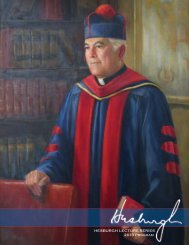HESBURGH LECTURE SERIES 2012 Program - Alumni Association ...
HESBURGH LECTURE SERIES 2012 Program - Alumni Association ...
HESBURGH LECTURE SERIES 2012 Program - Alumni Association ...
Create successful ePaper yourself
Turn your PDF publications into a flip-book with our unique Google optimized e-Paper software.
M. Brian Blake, Ph.D.<br />
Professor, Computer Science; Associate Dean of Engineering for<br />
Research, College of Engineering<br />
Biography<br />
M. Brian Blake is a professor of computer science and associate dean of engineering for<br />
research in the College of Engineering at the University of Notre Dame. As a professor, Blake<br />
is a technical expert in the field of software engineering as it relates to Internet computing and<br />
web-based systems. He has published over 100 journal articles and refereed conference papers<br />
in the areas of Internet computing, software engineering, intelligent agents and workflow,<br />
Categories<br />
distributed data management, and software engineering education. Over the past eight years,<br />
Communications,<br />
his research lab has been awarded over $7 million in sponsored research from the National<br />
Engineering, Science, Social<br />
Science Foundation, DARPA, Department of Education, Federal Aviation Administration, the<br />
Concerns<br />
MITRE Corporation, Air Force Research Lab, SAI, and the National Institutes of Health. Blake<br />
is an associate editor for two of the top most recognized journals in his specialty, IEEE Internet<br />
Computing and IEEE Transactions on Services Computing. In 2007, Blake was named one of the Top 10 Emerging Scholars by<br />
Diverse: Issues in Higher Education.<br />
In his affiliate role as associate dean in the college, Blake is the primary contact for college-wide research activities and the<br />
conduit for interdisciplinary research initiatives between the college and the University. His responsibilities include the<br />
development of faculty and graduate student recruitment and diversity strategies, as well as interaction with corporate and<br />
foundation partners on external initiatives. Additionally, Blake has been a role model for underrepresented minorities in science<br />
and engineering. In 2005, Blake became the youngest African-American to ever earn tenure in a computer science department.<br />
In 2007, he became the first African-American department chair at Georgetown University. Currently, he is the first African-<br />
American tenured full professor in the college. In addition to technical research, Blake leads several initiatives to increase the<br />
number of underrepresented minorities in science and engineering. He is highly sought as a speaker to college and high school<br />
students. He also is the principle investigator of an NSF-funded project that seeks to recruit students into science and engineering<br />
from mainstream events, such as shopping malls and sporting events.<br />
Blake received a Bachelor’s of Electrical Engineering from Georgia Institute of Technology and a Ph.D. in information and<br />
software engineering from George Mason University. More information about Blake can be found at cse.nd.edu/~mblake3.<br />
Lectures<br />
The Need for Computer Scientists in a Bold New World<br />
One decade serving as a faculty member in a computer science department is perhaps not a long time in an academic sense.<br />
However, it does represent a good milestone by which to reflect on the challenges of navigating life while on the computer science<br />
and information technology track. We are in the midst of interesting times: Historic changes in Washington, D.C.; financial<br />
and economic unrest; and the continued growth and reliance on information technology, just to enumerate a few. This lecture<br />
attempts to put the conditions around the world in context for the aspiring scientist. This lecture also will highlight information<br />
research opportunities as they overlap the research interest of the presenter. In addition, having navigated this journey wearing<br />
the “underrepresented minority” tag, this lecturer discusses the impact of diversity issues.<br />
Religion, Race, and Technology<br />
Technological innovations have greatly impacted the way in which society interacts. Information affecting attitudes and personal<br />
views can be transmitted at a light speed. This lecture examines technology in the context of two important aspects of human life:<br />
questions of faith and challenges of diversity.<br />
The Hesburgh Lecture Series, <strong>2012</strong> <strong>Program</strong> 15



